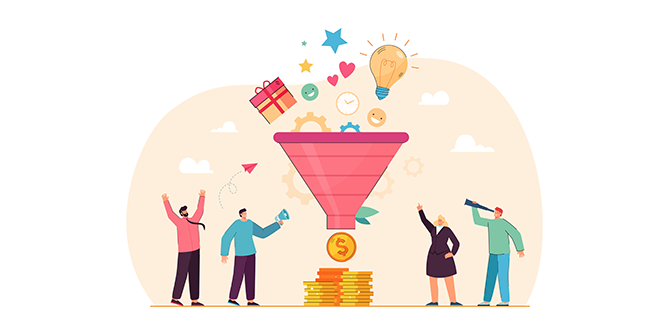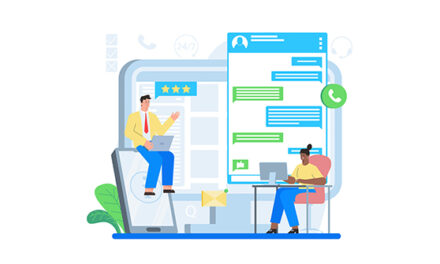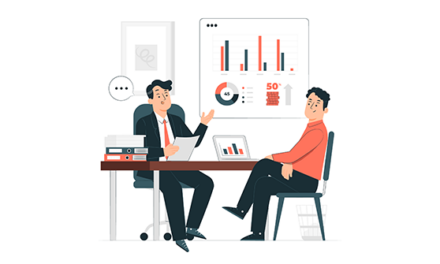Key Takeaways
- A consulting sales funnel is a systematic approach to turn potential leads into paying customers.
- The stages of a consulting sales funnel include awareness, interest, consideration, decision, and action.
- Consultants can use tactics like search engine optimization (SEO), pay-per-click (PPC) advertising, social media ads, and content marketing to increase brand awareness.
- The different types of sales funnels that every consultant needs to be familiar with include lead generation funnel, lead nurturing funnel, and sales conversion funnel.
Are you a consultant and looking to skyrocket your business growth or increase your revenue?
Then you’re in the right place!
As a consultant, you know that landing prospects can be challenging and time-consuming.
You might have a great reputation, excellent credentials, and expertise, but if you’re not effectively showcasing your services, you might miss out on opportunities to grow your business.
That’s where a consulting sales funnel comes in.
A sales funnel is a series of steps designed to attract, engage, and convert potential leads into paying customers.
With the help of sales funnel experts, you can focus on providing top-notch consulting services while they handle the process of attracting and retaining prospects.
In this article, we’ll explore the definition, importance, and benefits of sales funnels for consultants. We’ll also explore the different types of sales funnels that every consultant needs to be familiar with.
So, whether you are experienced consultant or just starting a consulting business, keep reading to discover how to take your business to the next level!
What is consulting sales funnel?

A consulting sales funnel is a systematic approach to turning potential leads into paying customers.
It is a step-by-step process that guides potential leads through the different stages of the buyer’s journey.
The stages of a consulting sales funnel may vary depending on the type of consulting service you provide, but typically include awareness, interest, consideration, decision, and retention.
Importance of consulting sales funnel
A well-designed sales funnel for consulting business is crucial for attracting and retaining prospects. It helps them to:
Generate leads
By implementing a sales funnel, consultants can create a consistent flow of leads that can be nurtured and converted into paying clients.
It is essential because consultants may need steady tips to maintain a consistent income.
Build relationships with prospects and establish trust
A sales funnel consultant helps to build relationships with potential leads by providing them with valuable information and insights.
By establishing trust and credibility, potential leads are more likely to convert into paying customers.
Provide value to prospects and position themselves as experts in their niche
By offering valuable content and resources, consultants can demonstrate their expertise and position themselves as thought leaders in their niche.
It helps to differentiate them from competitors and increase their perceived value in the eyes of potential leads.
Convert potential leads into paying customers
The sales funnel’s primary objective is to transform potential leads into paying clients.
Consultants can enhance their chances of doing this by presenting value, creating trust, and providing a transparent process for customers to work with them.
Stages of a consulting sales funnel

A typical funnel for consulting services consists of several stages that guide a prospect from the initial stage of awareness to the final stage of conversion. These stages include:
Awareness
The awareness stage is the first stage of the consulting sales funnel. In this stage, potential buyer become aware of the consultant and their services.
This stage involves creating brand awareness through various marketing channels such as social media, advertising, and content marketing.
To increase brand awareness, consultants can use tactics like search engine optimization (SEO), pay-per-click (PPC) advertising, social media ads, and content marketing.
Interest
After becoming aware of the consultant and their services, the potential client shows interest by exploring further.
For example, they may visit the consultant’s website, social media profiles, and attend webinars or events hosted by the consultant.
Consulting firms can utilise strategies like writing informative blog posts, whitepapers, and case studies to provide valuable information to prospects.
Consideration
At this stage, the prospect evaluates the consultant’s services and compares them with other options available in the market. They may ask for more information or schedule a call with the consultant.
This stage involves building relationships with prospects and providing them with additional information about the consultant’s services.
Consultants can use tactics such as email marketing and conducting webinars to actively involve prospects and furnish them with additional details.
Decision
The decision stage is the fourth stage of the consulting sales funnel. In this stage, prospects have decided to work with the consultant.
This stage involves finalizing the agreement and moving forward with the engagement.
There are several approaches that consultants can adopt to secure the deal and ensure that all parties comprehend each other’s expectations, such as making sales calls and scheduling face-to-face meetings
Action
The action stage is the final stage of the consulting sales funnel. In this stage, the consultant delivers their services to the prospect.
This stage involves providing high-quality services that meet or exceed the client’s expectations.
To check on prospect’s satisfaction with services and gain feedback for future changes, consultants can employ strategies like client surveys and testimonials.
Types of sales funnels that every consultant must know
Sales funnels are critical to the success of a consultant’s business, and every consultant must build or be aware of various funnels.
These funnels can help a consultant to attract and retain prospects while providing value to them.
Lead generation funnel
The first type of sales funnel is the lead generation funnel, which focuses on generating leads and building awareness of your consulting services.
At this stage, the goal is to attract potential leads and capture their interest.
This is typically achieved through various marketing strategies such as content marketing, social media marketing, and email marketing.
Lead nurturing funnel
The lead nurturing funnel focuses on building relationships with potential leads and provide value to encourage conversion.
At this stage, the goal is establishing trust and credibility with potential leads.
This is typically achieved by providing valuable information through content marketing, webinars, and consultations.
Conversion funnel
The conversion funnel focuses on converting leads into paying customers.
At this stage, potential leads have already shown interest in your services and have been nurtured to the point where they are ready to take the next step.
It is typically achieved through proposals, consultations, and other sales strategies.
Sales funnel for post-conversion
After successfully converting a potential client, retaining them and cultivating loyalty is crucial. This is where the post-conversion funnel comes into play.
This stage of the sales process concentrates on maintaining communication and support with the client to establish a long-term relationship.
Regular check-ins, client surveys, and feedback are commonly employed to achieve this goal.
This strategy promotes loyalty and provides an opportunity to gather valuable insights for improving the consulting services.
Designing and optimizing your consulting sales funnel
To design and optimize your consulting sales funnel, you need to follow a few steps:
Identifying your target audience
The first step in designing your sales funnel is to identify your target audience. Who are your ideal customers, and what are their pain points?
You need to have a clear understanding of your audience to create content that resonates with them.
Defining your value proposition
Your value proposition is what sets you apart from your competitors. What unique value do you offer to your prospects?
It’s essential to clearly define your value proposition and communicate it effectively throughout your sales funnel.
Creating a lead magnet
A lead magnet is a free resource that you offer to potential leads in exchange for their contact information.
Popular forms of lead magnets include e-books, white papers, webinars, and presentations. The lead magnet should be relevant to your audience and provide value.
Developing a lead capture form
Once you have a lead magnet, you need to create a lead capture form to collect contact information from prospects.
The form should be simple and easy to fill out and ask for only the necessary information.
Using analytics to track and improve performance
Analytics are crucial to understanding how your sales funnel is performing.
You need to track metrics such as conversion rates and bounce rates to identify areas for improvement.
A/B testing different elements of the funnel
A/B testing involves testing two versions of a page to see which one performs better.
For example, sales funnel experts can try different sales funnels elements, such as headlines, images, and call-to-action buttons.
Conclusion
In conclusion, a well-designed and optimized consulting sales funnel can be a game-changer for the success of any consultant.
It’s not just about attracting more leads, but also about building relationships, providing value, and converting potential leads into paying customers.
In today’s competitive consulting landscape, a well-designed and optimized sales funnel can make all the difference in attracting and retaining prospects, growing your business, and achieving your goals.
So don’t hesitate to invest the time and effort to create a sales funnel that works for you and your business!




